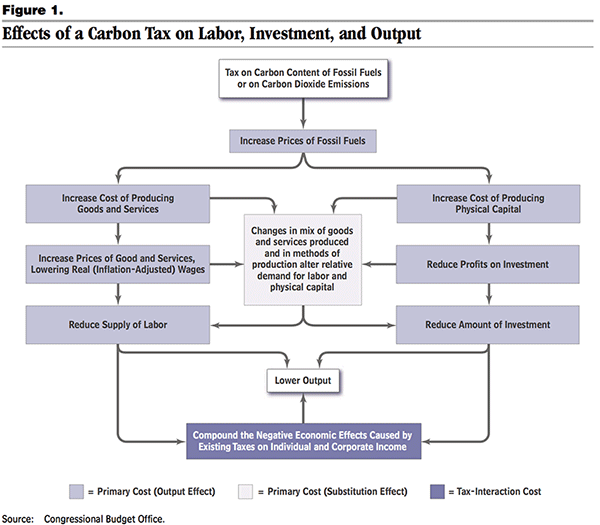The Congressional Budget Office (CBO) recently released its report on the impact of a carbon tax. (Disclaimer: I provided comments to the CBO on a draft of the report, earlier this year.) The economic parts were pretty sensible and conclude that (be sure you are sitting down)—there are no free lunches.
Here is their flow chart showing the impacts of a carbon tax:
Notice all paths eventually end up at the box called “Lower Output,” which is a bad place to be.
In its analysis of a carbon tax, the CBO discusses a variety of scenarios for disposing of the carbon-tax revenue. They note that some scenarios can partially offset the negative impact of the carbon tax. However, using that revenue to offset the impact on lower-income households, who suffer the tax effects most out of proportion to their income, is a pure transfer and does not moderate the tax’s negative impact on the economy. Any tax revenue used to offset the impact on income and energy prices for low-income earners must come from others who are also suffering from lost income and higher energy costs.
A carbon tax puts everybody in the “Lower Output” box. Transfers to help some can only make the others even worse off.
So here is the story. A carbon tax will be bad for the economy and will disproportionally harm low-income households. The revenues can, theoretically, be used to cut taxes elsewhere to reduce (but not eliminate) the negative effects on the economy or the revenues can be used to offset the impacts for a subset of households. The same revenue cannot be spent twice.
A little perspective on the tax swap or offset makes it clear that even this option for partial mitigation is not realistic.
The first option discussed by the CBO uses the revenue to cut the deficit. It doesn’t actually do an economic analysis. Instead the CBO points to one of its earlier studies showing the income tax cuts a decade ago, alone, would reduce national income. Since this implies that raising an income tax while holding spending constant would be good, the CBO argues that a tax can reduce the deficit and be good for the economy. Without debating the analysis of that particular tax cut, we can simply note the lack of examples where Washington raised taxes without spending any of it. So, forget that option.
The CBO later discusses the option of cutting taxes on capital with the carbon tax revenue. They don’t specifically analyze this case either, but point to studies showing that swapping a higher income tax for a lower tax on capital would have a positive net impact on the economy.
In theory maybe this could be an efficient swap, but why, then, haven’t we seen any such swaps to lower taxes on capital? Here’s why: It is much easier to demagogue the issue of rich capitalists versus average income earners than it is to make the economy better for everyone. (To be sure, taxes on capital are not just taxes on the rich. However, demagoguery easily sidesteps this fact.) This is why you are not going to see an explicit tax on average earners linked to a cut on capital taxation—it is red meat for liberal redistributionists.
One of the possibilities that the CBO did not analyze is using the carbon-tax revenue to fund wasteful projects for crony capitalists. Think Solyndra, Fisker Automotive, A123 Batteries, etc. This is the most likely use of big chunks of any carbon-tax revenue and only strengthens the already strong argument against levying a carbon tax.
In short, the CBO gets right the basic question: Will a carbon tax, however clever you are with it, improve the economy?
The answer: No.
This piece originally appeared in The Daily Signal



